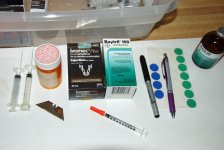eddie1976
New member
Well...really it makes sense. A vet is required to know intimately the inner workings of a majority of several different species of animals. A doctor is required to only know one. It takes an incredibly special individual to become a vetrinarian and they have my utmost respect.
When I say that local vets don't know anything about reptiles...it's not meant as a dig. Reptiles and exotics are simply not a commonly kept pet around here. Horses, mules, donkeys, dogs, cats, rabbits, rodents, fish, cows, chickens, and just about any mammal large or small...I would trust my local vets 110%. They are great doctors. But there is no demand for exotic bird and reptile vets in my area. We, the keepers, know this, and so do the vets. So the keepers learn as much as possible with close assistance from the vets(free of charge when possible), and we help each other as much as we possibly can. If someone "in the circle" can't fix the problem, one of us knows someone "outside the circle" that probably can.
This works to everyone's advantage, really, because the vets have reliable people they can send patients too when necessary, and saves the keepers spending extra money. It also helps that the vets around here trust most of us enough to go ahead and prescribe us supplies like hypodermic needles and broad spectrum antibiotics without too much hassle. They know we will eventually need it, and that we are pretty good at diagnosing when and how to administer it, so they don't have many qualms about letting us have access to it...
I remember the first few months of school, she had to memorize every bone muscle and nerve in the dog, cat, horse, pig, cow, and rabbit. Just looking through all of that gave me a headache.
I do not think that she would have taken so many electives in exotics and reptiles if not for my personal menagerie. She has a couple of good herp people in the area who she trusts enough to let them treat at home. That is good because those people tend to recommend the more inexperienced people to her to let her treat their animals and word of mouth is very good advertising.



